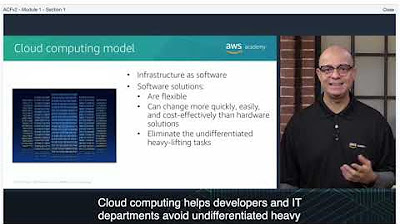6 Advantages of Cloud Computing
Summary
TLDRThe video script discusses AWS's six key advantages of cloud computing over traditional models. These include trading capital expense for variable expense, benefiting from economies of scale, eliminating capacity guessing, increasing speed and agility, ceasing data center spending, and enabling rapid global expansion. The script emphasizes how cloud computing allows for more efficient resource use, cost savings, and innovation, providing a competitive edge for businesses.
Takeaways
- 💼 **Capital Expense to Variable Expense**: AWS highlights the shift from large upfront capital expenses (capex) to variable operational expenses (opex) as a key advantage of cloud computing.
- 💼 **Tax Deductibility**: With opex, cloud computing expenses are tax deductible in the same year, unlike capex which is spread over several years.
- 🌐 **Economies of Scale**: AWS benefits from massive economies of scale due to its large customer base, leading to lower costs for customers.
- 🚀 **Capacity Management**: Cloud computing eliminates the need to guess capacity, allowing for adjustments based on actual demand, reducing resource waste.
- 🔧 **Speed and Agility**: AWS enables rapid deployment of resources and quick responses to market changes, enhancing business agility.
- 💼 **Reduced Data Center Costs**: AWS encourages businesses to stop spending on maintaining data centers and instead invest in innovation.
- 🌟 **Innovation Focus**: By offloading data center management to AWS, businesses can focus on developing new services and gaining a competitive edge.
- 🌍 **Global Reach**: AWS allows for easy global deployment of resources, which was previously difficult to achieve.
- 📈 **Competitive Advantage**: The agility and global reach provided by AWS can help businesses respond faster to customer needs and outpace competitors.
Q & A
What are the six advantages of cloud computing as described by AWS?
-The six advantages of cloud computing according to AWS are: 1) Trading capital expense for variable expense, 2) Benefiting from massive economies of scale, 3) Stopping guessing capacity, 4) Speed and agility, 5) Stopping spending money on running and maintaining data centers, and 6) Going global in minutes.
How does the cloud computing model differ from traditional models in terms of capital expenditure?
-In traditional models, capital expenditure (capex) involves significant upfront costs for purchasing equipment and setting up data centers. In contrast, cloud computing operates on an operational expenditure (opex) model where users pay for services on a pay-as-you-go basis, only for what they use.
What is the tax implication of the cloud computing model compared to traditional models?
-With traditional capex models, expenses are tax deductible over a depreciation lifetime, which can span several years. In the cloud computing opex model, expenses are deductible in the same tax year, providing quicker tax benefits.
How does AWS leverage its large customer base to benefit its users?
-AWS benefits from economies of scale due to its large customer base, which allows it to aggregate usage and negotiate lower costs. These savings are then passed on to customers, resulting in lower variable costs for them.
What is the advantage of cloud computing in terms of capacity management?
-Cloud computing eliminates the need to guess capacity by allowing users to adjust their resource allocation based on actual demand, thus avoiding the waste of over-provisioned resources that is common in traditional IT setups.
How does cloud computing enhance speed and agility for businesses?
-Cloud computing allows for quick and easy deployment of resources through API calls, command line, or management consoles, enabling businesses to respond to market changes faster and bring new services to market more rapidly.
Why does AWS encourage users to stop spending on data center maintenance?
-AWS believes that spending time and money on data center maintenance is a low-value activity that does not differentiate businesses. Instead, they encourage investing in innovations that can provide a competitive edge.
What does 'going global in minutes' mean in the context of cloud computing?
-'Going global in minutes' refers to the ability to deploy resources and services worldwide quickly and easily, which was previously difficult and time-consuming, but is now simplified through cloud computing platforms like AWS.
How does the pay-as-you-go model of cloud computing benefit small businesses?
-The pay-as-you-go model allows small businesses to scale their spending according to their usage, avoiding large upfront costs and enabling them to grow at their own pace without being tied to fixed, high capital investments.
What is the competitive advantage of agility in cloud computing?
-Agility in cloud computing allows businesses to quickly adapt to customer needs and market changes, potentially outpacing competitors in innovation and service delivery, thus gaining a competitive edge.
How does AWS's ability to aggregate usage across customers contribute to cost savings?
-By aggregating usage across a vast customer base, AWS can achieve higher purchasing power, which leads to lower costs for infrastructure and services. These savings are then passed on to customers, reducing their overall expenses.
Outlines

このセクションは有料ユーザー限定です。 アクセスするには、アップグレードをお願いします。
今すぐアップグレードMindmap

このセクションは有料ユーザー限定です。 アクセスするには、アップグレードをお願いします。
今すぐアップグレードKeywords

このセクションは有料ユーザー限定です。 アクセスするには、アップグレードをお願いします。
今すぐアップグレードHighlights

このセクションは有料ユーザー限定です。 アクセスするには、アップグレードをお願いします。
今すぐアップグレードTranscripts

このセクションは有料ユーザー限定です。 アクセスするには、アップグレードをお願いします。
今すぐアップグレード関連動画をさらに表示
5.0 / 5 (0 votes)






